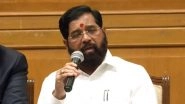Canberra, Oct 26 (AP) Australia's Prime Minister Scott Morrison said on Tuesday the country is set to reduce emissions by 35 per cent below 2005 levels by 2030, but he won't commit to such a target at the UN climate conference in Scotland.
Morrison said his government would stick with Australia's current 2030 target of reducing emissions by 26 per cent to 28 per cent below 2005 levels. The targets were adopted at the Paris climate conference in 2015 and are relatively modest compared to other wealthy countries' ambitions.
Also Read | Elon Musk-Run Electric Car Company Tesla Hits $1 Trillion Market Cap for First Time.
"We will meet it and we will beat it," Morrison said, referring to the 2030 target.
"We'll beat it with emissions reductions we believe of up to 35 per cent and we may even achieve better," he added.
Also Read | Pakistan Wants to Take Cricket Forward with India, Says PM Imran Khan After T20 World Cup Victory.
Australia had already reduced emissions by more than 20 per cent from 2005 levels, he said.
Australia will commit to a target of net zero carbon emissions by 2050 at the Glasgow conference.
Morrison's conservative Liberal Party-led government was narrowly reelected in 2019 with a climate policy that opposed the 2050 net zero target adopted by the opposition centre-left Labour Party.
Getting to the net zero commitment took political wrangling on the part of Morrison's ruling party, including winning the support of a rural-based junior coalition member — the Nationals party — with a number of concessions.
One of them was that Resources Minister Keith Pitt, who maintains Australia will continue exporting coal for decades, was made the fifth Nationals' Cabinet minister. Morrison on Monday announced Pitt's promotion.
The conditions also include a government review every five years of the economic impacts of the net zero target outside major cities. The first assessment would be delivered in 2023.
Finance Minister Simon Birmingham described the reviews as a "health check" on how various parts of Australia were being effected by the transition to net zero.
"What it will do is focus the minds of the government of the day very clearly on where additional investments may be necessary to help ensure the transition," Birmingham said.
British Prime Minister Boris Johnson, who will host the upcoming summit in Glasgow, known as COP26, congratulated Australia on its net zero ambition.
"That was very difficult for Australia because Australia's very heavily dependent on coal, on lots of carbon-producing industries, and they've done a heroic thing," Johnson said, referring to the 2050 commitment.
However Australia is likely to be criticized in Glasgow for its relatively weak 2030 target. The United States has committed to reductions of between 50 per cent and 52 per cent below 2005 levels. Britain has pledged to cut emissions by 68 per cent below 1990 levels.
Australia is one of the world's largest exporters of coal and liquified natural gas. The nation is also one of the world's worst greenhouse gas emitters per capita because of its heavy reliance on coal-fired power.
COP26 will assess progress since nations agreed in the 2015 Paris accord to limit warming to less than 2 degrees Celsius (3.6 degrees Fahrenheit). The meeting in Glasgow is widely seen as the last chance to hold global warming to 1.5 C (2.7 F) above pre-industrial levels. (AP)
(The above story is verified and authored by Press Trust of India (PTI) staff. PTI, India’s premier news agency, employs more than 400 journalists and 500 stringers to cover almost every district and small town in India.. The views appearing in the above post do not reflect the opinions of LatestLY)













 Quickly
Quickly


